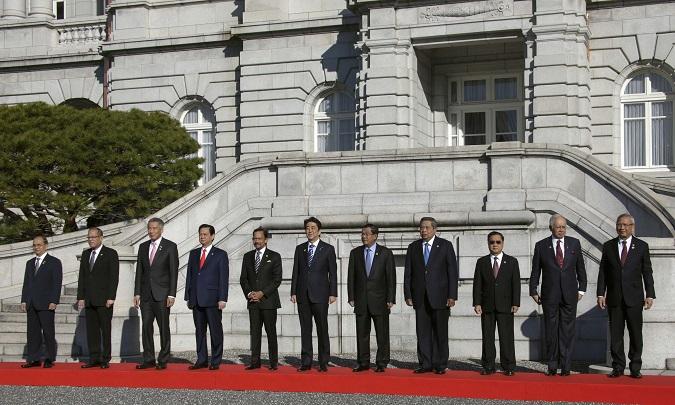Election calendar raises emerging market political risks
Bareksa • 17 Feb 2014

Leaders of ASEAN countries pose during a photo session (Reuters/Kimimasa Mayama)
The risks were highlighted earlier this month by a Thai general election that was disrupted by protesters
Reuters - Political risks in emerging markets are on the rise, with investors growing fearful of the potential fallout on business from this year's packed election calendar in the developing world.
All of the so-called Fragile Five countries - India, Indonesia, Turkey, South Africa and Brazil - hold elections in coming months, along with Hungary, widely seen as the weak link in emerging Europe.
The risks were highlighted earlier this month by a Thai general election that was disrupted by protesters. This is delaying the formation of a new government and putting key spending and borrowing decisions on hold.
Following is a factbox detailing election issues in key emerging economies: COLOMBIA - Parliamentary elections on March 9 and the first round of presidential elections on May 25. President Juan Manuel Santos is expected to be re-elected. The opposition candidate Ivan Zuluaga has slammed peace talks with Marxist guerrillas as offering the rebels too many concessions. Scores of death threats have been made against leftist parliamentary candidates.
TURKEY - Local elections on March 30 and presidential elections in August. Prime Minister Tayyip Erdogan's AK Party, in power since 2003, has seen its popularity slip since a corruption scandal erupted in December. The problems have been compounded by a dive in the lira currency, which has forced the central bank to jack up interest rates, threatening economic growth. A good showing in the local elections could encourage Erdogan to run for president in August but a drubbing could prompt him to change party rules and run for a fourth term as prime minister HUNGARY - Parliamentary election on April 6. Prime Minister Viktor Orban's Fidesz party leads opinion polls but support for the far-right Jobbik party is swelling, partly because of high unemployment. Hungary is slowly returning to growth following two bouts of deep recession after 2008 but investors are worried about central bank independence and see many of Orban's policies as anti-business.
INDONESIA - Parliamentary election on April 9, presidential election on July 9. Political parties must secure either 20 percent of the seats or 25 percent of the vote to nominate a candidate for the presidential election. There are concerns over the failure of the outgoing government of President Susilo Bambang Yudhoyono to resolve the economy's structural problems such as weak infrastructure and a current account deficit. SOUTH AFRICA - General election on May 7. The ANC, which has been in power for the past 20 years, is expected to extend its rule but with a reduced majority as a 25 percent unemployment rate has left most South Africans mired in poverty. Violent pre-election protests are gathering pace. Lack of reform has left the country with weak infrastructure, frequent labour unrest, low investment and a big current account deficit. Growth last year slowed to just 2 percent. INDIA - Parliament election in April-May. The opposition BJP, seen as more pro-business than the ruling Congress, is expected to lead a coalition government. India has suffered from a raft of corruption scandals, fiscal profligacy and reform paralysis that has hit investment and growth. The economy is expected to grow just 4.9 percent in the fiscal year ending March while inflation is near 9 percent. However, BJP leader Narendra Modi is a polarising figure for his alleged role in 2002 riots that killed over a 1000 Muslims. Courts have absolved him of any wrongdoing [ID :nL3N0LI5KB].
BRAZIL - Presidential and parliament election on October 5. President Dilma Rousseff is expected to win a second four-year term but Brazil's once-booming economy is entering a fourth year of slowdown, with growth expected around 2 percent in 2014. Investors blame excessive state intervention in the economy, stuttering exports to China and lack of reform. Millions of Brazilians protested in several cities late last year over poor public services, corruption and the expense of hosting the 2014 World Cup in June. BOLIVIA - Presidential election in December. Leftist President Evo Morales will seek a third term after a constitutional court last year ruled he could stand again even though Bolivia's old constitution had placed a two-term limit on candidates. Morales has nationalized private companies as part of his policy of increasing state control over the economy but he has been praised for sound fiscal management. ROMANIA - Presidential election in 2014. The European Union's second-poorest state is seeing an economic recovery but this could be undermined by a spat between the leftist government and centre-right President Traian Basescu. In 2012 a row between the prime minister and president sparked a constitutional crisis.
NIGERIA - Parliament and presidential election on Feb 14, 2015, followed by state governor elections a week later. They are expected to be the most closely fought since military rule ended in 1998. Political stability is a key concern in the oil-rich country. President Goodluck Jonathan, who is assumed to aspire for another term, this week sacked four cabinet ministers after overhauling the military last month. Nigeria's popularity as an investment destination has grown in recent years but is hobbled by rampant corruption, an insurgency in the oil-rich Niger Delta and Islamist militancy in the northeast. Political wrangling has stalled much needed reform.